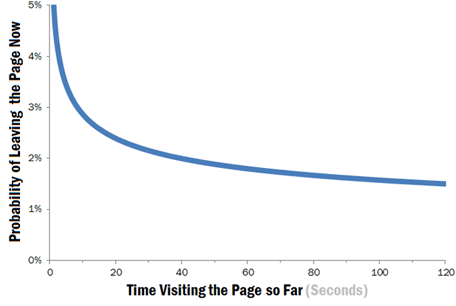It is not easy to cut through a human head with a hacksaw.
This is the first sentence of Michael Crichton’s excellent autobiography Travels, and those words have stuck with me since I read the book twenty years ago. Crichton was trained as a doctor, and he starts with a story of working on a cadaver at Harvard Medical School. He opens his book by opening a head.
A great opening sentence opens your reader’s head as well. It grabs her attention, and keeps her reading. Great opening sentences are critical when you’re writing for the internet, where readers have the attention span of fruit flies. (Present company excluded.)
Microsoft Research did a survey of more than 2 billion pageviews, and found that users spend ten seconds on an average Web page. That’s the bad news. The good news is that the longer you retain them, the more likely they are to stay. Check out the chart above, which comes from Jakob Neilsen’s summary of this research:
If the Web page survives this first — extremely harsh — 10-second judgment, users will look around a bit. However, they’re still highly likely to leave during the subsequent 20 seconds of their visit. Only after people have stayed on a page for about 30 seconds does the curve become relatively flat. People continue to leave every second, but at a much slower rate than during the first 30 seconds.
Ten seconds! At Media Shower, we train our writers to spend more time on the opening sentence than any other part of the article. Here are a few “opening sentence hacks” that can help you hook ’em in ten seconds.
Tell a Story
As Chip and Dan Heath drive home in their great book Made to Stick, the human brain is hard-wired for stories. Before we invented writing, we invented stories. “Tell me a story,” asks every child, and adults are no different. A good story is an electromagnet for the human mind
Examples of great opening sentences abound in fiction, since fiction is all about telling stories. For example:
They shoot the white girl first. —Toni Morrison, Paradise (1998)
He was an old man who fished alone in a skiff in the Gulf Stream and he had gone eighty-four days now without taking a fish. —Ernest Hemingway, The Old Man and the Sea (1952)
I am an invisible man. —Ralph Ellison, Invisible Man (1952)
In my younger and more vulnerable years my father gave me some advice that I’ve been turning over in my mind ever since. —F. Scott Fitzgerald, The Great Gatsby (1925)
It was the day my grandmother exploded. —Iain M. Banks, The Crow Road (1992)
The author has dropped you into the story — not at the very beginning, but at an interesting moment where you want to find out more. If possible, you want to immediately raise a question in the reader’s mind. Why do they shoot the white girl first? What was the advice his father gave him? Why did his grandmother explode?
Even if you’re not writing fiction, you can usually find a story to illustrate your point. If you’re writing about small business topics, you can find an interesting small business case study. If you’re writing about your product, you can explain how a real customer used it. Show, don’t just tell.
Ask a Question
Instead of raising a question, you can also directly ask a question. In our experience, this works best if the question is self-reflective, and not too difficult. For example:
When was the last time you washed your car?
How much margin does your company make on an average sale?
Do you know the age of your average customer?
Asking an easy question up front is a honeypot for your reader. It he invests a fraction of time thinking about your question in that elusive ten-second window, he’ll be more likely to stay through to the end. Even if he leaves the page, he’ll have an interesting question to chew.
Tell Me Something About Myself
Who is the most important person in the world to your reader? Your reader. Tell your reader something about herself, or (even better) promise to tell her something about herself later in the article, after you’ve made your point. For example:
Did you know your brain can’t multitask?
If you’ve wondered how much you spend on heating costs compared to the average homeowner, here are the numbers.
Here’s the simple reason you feel sluggish the day after you eat a big meal.
A new research study shows the most common reason small businesses fail — and how you can avoid it.
You spend ten seconds reading the average Web page; here’s why.
Stay Positive
“If it bleeds, it leads,” goes the old news adage, meaning people are more likely to read bad news than good. I reject this philosophy.
Your opening sentence reflects on your company, your brand, and yourself. The vast majority of your readers will click away without reading anything else. It’s the snippet that will be displayed on social media, RSS feeds, and blog previews, so it’s often the only sentence people will read.
If your opening sentence offers something hopeful, interesting, or thought-provoking, you add a little bit of positive momentum to your reader’s day. He may not read your entire piece, but it will make a difference. Next time you post, that little bit of forward brand association, that tiny bit of impetus, may cause him to click through.
Eventually, you may find him reading all the way to the end.
Sir John Hargrave is the CEO of Media Shower and author of Mind Hacking, available in 2016 from Simon & Schuster’s Gallery Books. This post is free to distribute under Creative Commons 4.0: if you like it, share it.
